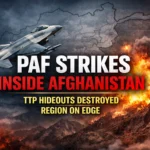Doha, September 2025.
Qatar, one of the richest states in the Gulf, boasts of spending nearly $19 billion on defense — a staggering figure for a nation of less than three million people. Its arsenal includes U.S. Patriot PAC-3 batteries, French Rafale fighters, Turkish Bayraktar drones, and German Leopard tanks. Above it all looms the crown jewel: Al Udeid Air Base, the largest U.S. military installation in the Middle East, housing more than 10,000 American personnel and some of the most advanced surveillance systems in the world.
On paper, Doha should be one of the safest capitals on earth.
In reality, it proved to be one of the most vulnerable.
The Strike in Katara
At 15:35, minutes after the Asr call to prayer, explosions ripped through Katara, Doha’s diplomatic district, home to embassies and luxury residences. Israeli warplanes fired precision missiles into the compound housing Hamas’ top leadership, long sheltered by Qatar.
The office of Khalil al-Hayya, Hamas’ chief in Gaza, was obliterated. Guard quarters and staff residences were torn apart. At least 10 people were killed, including al-Hayya’s son, office director Jihad Lubad, and several guards.
The Hamas leaders themselves escaped death by minutes — not thanks to Qatari defenses, but because they had left for Asr prayers at a nearby mosque, leaving behind the mobile phones Israel was likely tracking.
The Silent Patriots and the Silent Allies
The strike left a trail of uncomfortable questions:
- Why were Qatar’s Patriots silent? Billions were spent on U.S.-supplied PAC-3 interceptors, yet none were fired.
- Why didn’t the Rafales scramble? The French jets, bought to defend Qatar’s skies, never took off.
- Where was Al Udeid? Just 30 kilometers away, the massive U.S. base hosts AWACS aircraft, radar arrays, and air-defense systems capable of detecting and intercepting incoming threats. Yet not a single alarm was raised, not a single jet dispatched.
- And Turkey? With a base in Doha and a defense pact with Qatar, Ankara too stood by.
Al Udeid: The Shield That Never Was
Just outside Doha lies Al Udeid Air Base, America’s largest fortress in the region. Built with Qatari money but run under U.S. command, it houses 10,000 U.S. personnel, fleets of F-15s, F-22s, and AWACS, and some of the world’s most advanced surveillance systems. Washington has long presented Al Udeid as a “guarantee” of Qatar’s security.
But when Israeli missiles struck the heart of Doha, Al Udeid stayed silent.
No jets scrambled. No interceptors launched. No warnings issued.
The base that was supposed to defend Qatar proved what many had suspected: its true mission is not to protect Doha, but to project U.S. power and safeguard American and Israeli interests.
For Qatar, the Katara strike was a bitter lesson — even hosting America’s biggest fortress doesn’t buy sovereignty, let alone dignity.
The Hypocrisy of U.S. Protection
For years, Washington justified its heavy military footprint in Qatar by claiming it was there to “defend allies” and “stabilize the Gulf.” Yet when Israeli warplanes struck just kilometers away, U.S. forces did nothing.
This raises the most damning question of all: Was the silence deliberate?
- Did Washington give Israel a green light, prioritizing Tel Aviv’s objectives over Doha’s sovereignty?
- Did Qatar finally learn that its $19 billion arsenal and U.S. “protection” were never truly its own?
Conclusion: An Illusion Shared Across the Gulf
Qatar’s humiliation is not unique. Across the Gulf, states like Saudi Arabia and the UAE have discovered the same bitter truth: billions spent on Western arms and American bases do not guarantee protection. From the Aramco strikes in 2019 to the missile attacks on Abu Dhabi, and now the Israeli strike in Doha, the pattern is undeniable — U.S. protection is an illusion.
Qatar bought weapons. It bought alliances. But when the missiles came, it could not buy respect.









